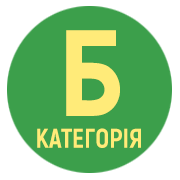THE ROLE OF SCIENCE TEACHERS IN FORMING RADIATION LITERACY OF SECONDARY SCHOOL STUDENTS
Abstract
The article defines and substantiates the role of the science teacher in the formation of radiation literacy of secondary school students. It is emphasised that the constant increase in the use of radiation technologies in various spheres of life makes knowledge about radiation and its impact on the human body vital. Unfortunately, many students do not have a clear understanding of radiation, its properties and effects, which can lead to dangerous consequences. It is emphasised that science teachers play a key role in the formation of students' radiation literacy. The article analyses and summarises the national and foreign experience of forming radiation literacy of schoolchildren in the conditions of secondary schools. The key trends in modern science education in the development of radiation literacy of schoolchildren are identified. In addition, different interpretations of the concept of “radiation literacy” are outlined. Based on the analysis, it is proved that radiation literacy has cognitive, activity and value components. The functions of the science teacher in the cognitive context and in the formation of a number of activity qualities in students that will help them apply their knowledge and understanding of radiation in practice are outlined. The key educational content and activity components of a science teacher in the context of the formation of students' radiation literacy have been identified, namely study of the basics of radiation physics and chemistry (understanding of the nature of radiation, its types, patterns of interaction with matter and its impact on living organisms, analysis of biological effects of radiation (understanding of the mechanisms of radiation action on biological systems, exposure levels, carcinogenic and mutagenic effects of radiation, study of dosimetry and radiation protection methods (methods of measuring radiation doses, means of individual and collective protection against radiation, familiarisation with the principles of radiation ecology (understanding of the distribution of radioactive substances).
References
2. Андрійчук Р. Г., Васильєва Р. Ю. Підготовка майбутніх вчителів до формування безпечної поведінки школярів в зоні радіаційного контролю. Наука і освіта. Науково-практичний журнал Південного наукового центру НАПН України. 2008. № 1. С. 14–18.
3. Anjos R. M., et al. Radioactivity teaching: Environmental consequences of the radiological accident in Goiânia (Brazil). American Journal of Physics. 2001. V. 69. 3. P. 377–381.
4. Hachiya Misao, Akashi Makoto. Lessons learned from the accident at the Fukushima Dai-ichi nuclear power plant – more than basic knowledge: education and its effects improve the preparedness and response to radiation emergency. Radiation protection dosimetry. 2016. V. 171. 1. P. 27–31.
5. Metcalfe R. D., et al. A web-based resource for radiation safety courses. In: Proceedings of The Australian Conference on Science and Mathematics Education. 2002. P. 90.
6. Kostadinova B., et al. Implementation of radioecological education in secondary school by a'Radiation and man'elective course. 2004. P. 1–16.
7. Концепція «Нова українська школа»: прийнята 27 жовтня 2016. URL : https://mon.gov.ua/storage/app/media/zagalna%20serednya/nova-ukrainska-shkola-compressed.pdf (дата звернення: 11.04.2024).
8. Kirsch I. S. The international adult literacy survey (IAL S): Understanding what was measured. ETS Research Report Series. 2001. № 2001.2. С. 61.
9. Klein P. D. The challenges of scientific literacy: From the viewpoint of second‐generation cognitive science. International Journal of Science Education. 2006. № 28.2-3. С. 143–178.
10. Choi K., Cho J. K. Development and statistical assessment of a radiation safety literacy measurement tool. International Journal of Radiation Research. 2021. № 19.1. С. 41–48.
11. Ranasinghe N., Perera U., Mahakumara P., Rathnaweera N., Rathnayake P., Toda T., Iimoto T. Development of radiation literacy among secondary school students in SRI LANKA . Journal of Environment and Safety. 2019. № 10(2). С 37–40.
12. G., Wu, X., Liu, Y. Y., Hu, Y., Li, Y., Zhang, R., ... & Li, X. Research on radiation sensitive biomarkers and status of radiation safety literacy under low dose irradiation: Radiation biomarkers and radiation safety culture. Journal of Radiation Research and Applied Sciences. 2023 № 16(4).






